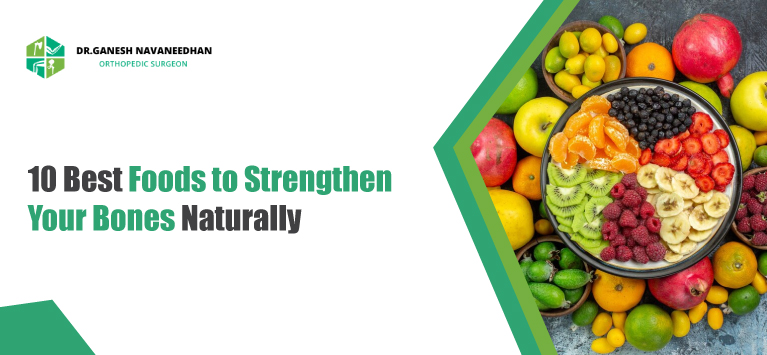- +91 8848509072
-
Sasthamangalam, Trivandrum
Sasthamangalam, Trivandrum

Having strong, active bones is crucial to living a healthy life. Is it possible to improve our bone health naturally? If yes, how can we do it? Yes, You can naturally strengthen your bones and lower your risk of osteoporosis and fractures by taking the appropriate steps.
In this comprehensive article, we will explore five natural strategies to enhance the health of your bones. From incorporating calcium-rich foods into your diet to understanding the nutrients that play a crucial role in bone strength, we will delve into essential information to support your overall bone health. Additionally, we will examine the benefits of specific fruits and nuts known for their bone-strengthening properties, providing valuable insights to optimize your overall well-being.
Calcium is a crucial mineral for bone health as it helps protect the bone structure and maintain bone strength. Incorporate calcium-rich foods into your daily meals, such as dairy products (milk, yoghurt, and cheese), soy products (tofu and tempeh), nuts (almonds and chia seeds), and leafy green vegetables (kale and spinach). If you have difficulty consuming enough calcium through your diet, consider taking calcium supplements after consulting with your healthcare provider.
Regular weight-bearing exercises, such as walking, aerobics, and dancing, help strengthen bones and improve overall balance. Try to engage in moderate-intense physical activity for at least half an hour on each day of the week. Weight-bearing exercises put stress on your bones, which stimulates bone growth and strengthens them over time. Incorporating such exercises into your routine can significantly contribute to healthy bones and reduce the risk of fractures.
Vitamin D is vital for calcium absorption and bone strength. Rich sources include fatty fish, sun-exposed mushrooms, and fortified foods such as cereals, milk, and orange juice. Sunlight exposure facilitates its synthesis in the body. If access to sunlight is limited or dietary intake is insufficient, consult your healthcare provider about vitamin D supplementation. Adequate levels of vitamin D help build strong bones and lower the risk of osteoporosis and other bone-related conditions.
Smoking and excessive drinking can both be harmful to the health of your bones. Smoking interferes with the absorption of calcium and reduces bone density, while heavy alcohol intake can disrupt bone formation and increase the risk of fractures. Quitting smoking and limiting alcohol consumption are crucial steps in preserving bone mass and reducing the risk of osteoporosis and fractures. It not only benefits bone health but also your overall well-being.
Protein is essential for maintaining bone health, as it helps prevent bone loss and preserve bone mass, and it provides the building blocks necessary for bone formation and repair. Include protein-rich foods in your diet, such as eggs, beans, and lean meats. Protein helps build and maintain muscle mass, which can reduce the risk of fractures. Consuming an adequate amount of protein helps prevent bone loss, preserves bone mass, and supports overall bone strength and integrity.
Here are some foods for increasing bone strength, which are found in fruits and nuts:
Pears: Vitamin C included in pears aids in the production of collagen, which is vital to bone structure. They also include boron, a mineral that helps rebuild bone strength by facilitating the absorption of calcium.
Apples: Antioxidants found in apples, such as flavonoids, may help lower inflammation and promote bone health. Increased bone mineral density has also been connected to flavonoids. There is also quercetin in them, which has been associated with a decreased risk of osteoporosis.
Grapes: Resveratrol, a substance found in grapes, has the potential to increase bone density and prevent bone loss. They also supply vitamin K, which is essential for calcium control and bone metabolism.
Soybeans: Plant-based protein, which is necessary for healthy bones because it aids in the formation of collagen, is found in soybeans. Additionally, they contain substances called isoflavones, which may aid in maintaining bone density and lowering the risk of fractures.
Raisins: Boron, a mineral found in raisins, aids in the absorption of calcium and maintains healthy bones. Additionally, they include potassium, which lessens the loss of calcium in the urine and helps preserve bone density.
Figs: Calcium, an essential mineral for strong and dense bones, is abundant in figs. They also include magnesium, in a reasonable amount, which supports strong and healthy bones in conjunction with calcium.
Peaches: Vitamin C from peaches helps to create collagen, which supports bone structure. Additionally, they contain potassium, which neutralizes acids that might cause the bones to lose calcium and help prevent bone loss.
Nuts: Nuts are an excellent source of zinc, magnesium, and calcium. Magnesium helps build new bones and absorb calcium, which promotes bone health. They also supply protein and good fats, both of which are generally necessary for strong bones.
Almonds: Calcium, magnesium, and vitamin E are abundant in almonds. Strong bones require calcium, magnesium helps with calcium absorption, and vitamin E functions as an antioxidant to shield bone cells from damage caused by oxidative stress.
Berries: Vitamin C, which is present in berries, promotes the formation of collagen and strong bones. They also offer antioxidants, which have been connected to higher bone mineral density and can aid in reducing inflammation, which, over time, may contribute to bone loss.
Here are some additional tips for better bone health:
In summary, putting a priority on overall wellness by combining a nutritious diet, frequent exercise, and lifestyle choices will significantly improve bone health. People can strengthen their bones and lower their risk of bone-related problems by adopting a balanced approach to diet, exercise, and self-care, which will improve health and general well-being. It’s critical to keep in mind that small, continuous efforts to maintain bone health can have a big impact over time, letting people lead active, enjoyable lives for a very long time.
Copyright © 2024 Dr. Ganesh Navaneedhan. All Rights Reserved. | Designed By Harvee healthcare